Evaluating Country Programmes - OECD Online Bookshop
Evaluating Country Programmes - OECD Online Bookshop
Evaluating Country Programmes - OECD Online Bookshop
You also want an ePaper? Increase the reach of your titles
YUMPU automatically turns print PDFs into web optimized ePapers that Google loves.
Rationale, purpose and use<br />
<strong>OECD</strong> 1999<br />
<strong>Country</strong> Programme Evaluation: Synthesis Report from the Workshop<br />
There was broad agreement about the general rationale for <strong>Country</strong> Programme<br />
Evaluation: as donors strengthen their focus upon country programming,<br />
evaluation at the country programme level offers valuable insights which can make<br />
use of and complement project or sectoral evaluation. As the review paper (see<br />
Chapter 2) and the various donor case study presentations made clear, however,<br />
the specific reasons for carrying out a CPE may vary considerably between donors<br />
and even between different exercises conducted by the same donor. There are<br />
many potential roles for a <strong>Country</strong> Programme Evaluation.<br />
Finally, and without detracting from the clear enthusiasm for CPEs expressed<br />
at the Workshop, it is important to note that there were also some cautionary comments.<br />
First, it was noted that there were occasions when poor donor co-ordination<br />
had resulted in an unnecessary duplication of effort in the preparation of CPEs, with<br />
a resulting increase in the burden upon partners. The more general point was that<br />
the strength of the argument for <strong>Country</strong> Programme Evaluation changes over time<br />
to reflect evolving agency practice. An agency which has conducted evaluations of<br />
most of its major country programmes may have learnt all it can at this point in time<br />
and would be advised to wait a few years before conducting further CPEs.<br />
Agreement on general rationale for <strong>Country</strong> Programme Evaluation<br />
The state-of-the-art review paper noted that there is widespread agreement<br />
among bilateral and multilateral donors that CPEs do have something of value to<br />
add to other forms of aid evaluation. This consensus was reiterated in the opening<br />
session and at other points during the Workshop. 2 The basic rationale for <strong>Country</strong><br />
Programme Evaluation that the country is in most cases the most logical unit of aid<br />
management and account is premised upon two observations.<br />
First, within national boundaries, political, economic and socio-cultural parameters<br />
can be taken as to some degree fixed: aid channelled to a given nation should<br />
reflect the needs and opportunities which can be observed at the country level,<br />
particularly with regard to the strengths and weaknesses of the partner government.<br />
Regardless of whether a donor’s aid to a given country is packaged as a country programme,<br />
there may be considerable value to evaluating all forms of aid to that<br />
country in consideration of national needs and opportunities.<br />
Secondly, and reflecting donor recognition of the point above, many donors<br />
now channel their aid through country programmes administered by national<br />
offices. As donor institutional practices (plans, budgets, staffing, reporting, etc.) are<br />
organised increasingly at the partner country level, the country programme<br />
becomes a focus for the evaluation of performance. 3 A shift to country programming<br />
logically implies a shift to <strong>Country</strong> Programme Evaluation.<br />
13






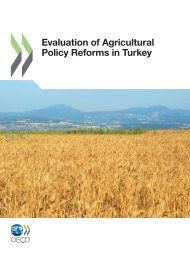
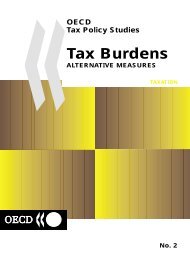

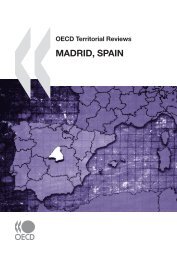



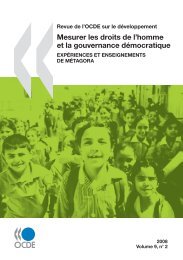
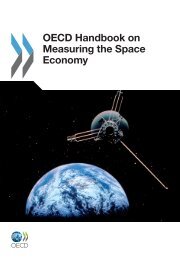


![CQE=U]^\]Z: KAZAKHSTAN - OECD Online Bookshop](https://img.yumpu.com/3915768/1/190x253/cqeuz-kazakhstan-oecd-online-bookshop.jpg?quality=85)